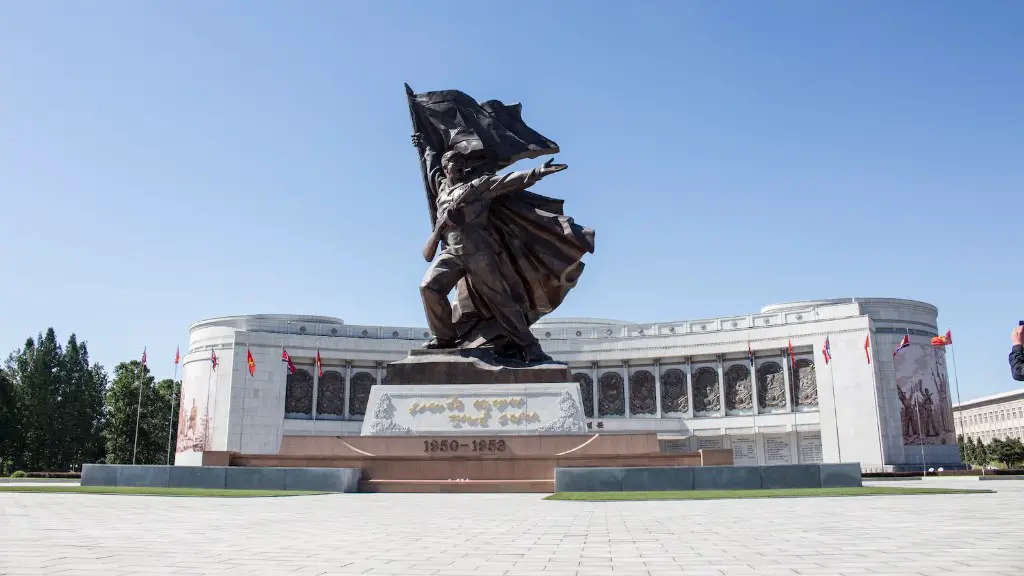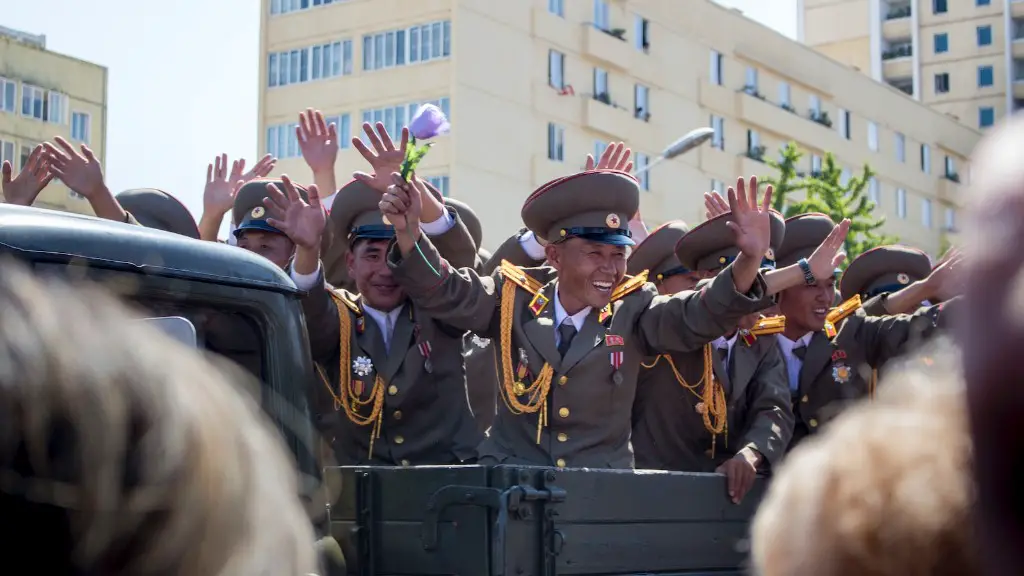Background Information of South and North Korea Conflict
South and North Korea have been facing each other in tension and hostility that dates back to the Korean War from 1950-1953. Following the withdrawal of troops from both sides of the conflict in 1953, an armistice was formed between the two countries, but a formal peace treaty was never signed. This armistice holds until today, thus, making South and North Korea technically still at war.
The bitter and unresolved animosity between the two countries has been bolstered by the vast differences in the political and economic systems of South Korea and North Korea. The South is a prosperous democracy, embraced by the international community, and heavily influenced by the United States. On the other hand, North Korea is an authoritarian country ruled under a harsh dictatorship, and with its closed-off economy, it has been isolated from the world.
Reasons For Conflict
One of the primary reasons for the conflict between South and North Korea has been disagreements over the setting of borders. South Korea claims the entire peninsula as its territory, whereas North Korea believes it should be shared between the two countries. Over the years, there have been several military incidents as a result of disputed maritime and land boundaries between the two countries, most notably the sinking of the South Korean warship Cheonan by North Korea in 2010 and the shelling of the South Korean island of Yeonpyeong by North Korea the same year.
In recent years, North Korea has continued to defy UN regulations by testing nuclear weapons and ballistic missiles, leading to heightened tensions in the region. South Korea and its ally, the United States, have reacted by issuing strong warnings and imposing international sanctions. North Korea, in turn, has responded with grave threats, including the possible use of nuclear weapons against its neighbouring countries.
Human Rights Situation
The deep divide between the two countries has had a detrimental effect on North Korean citizens, as its citizens are subject to some of the world’s worst human rights violations. The UN have issued several warnings accusing the North Korean government of a range of abuses, including forced labour and torture, as well as the constraints placed on freedom of speech and religion.
In addition, North Korean defectors have highly criticized the treatment of its own people, by citing the lack of basic necessities, such as food and medical supplies, in many parts of the country. These reports have shed light on the deplorable conditions, with numerous deaths in prisons as a result of starvation and poor medical care.
Potential Solutions
The on-going conflict between South and North Korea has been a cause of great suffering for people in both countries. To end the suffering, the two countries must come to an agreement of peace, through diplomacy and negotiations. However, while North Korea has recently opened its doors to more humanitarian aid, the situation still remains fragile and uncertain.
To achieve a lasting peace, South and North Korea should form a joint committee to discuss and implement a peace treaty. This could involve the withdrawal of foreign troops on both sides of the border and the repeal of certain restrictions regarding travel, trade and communication.
In addition, UN sanctions against North Korea should remain in place until real progress is made in tackling the issues of human rights and nuclear weapons. The international community must also remain engaged and support the peace process going forward.
Political Stigma Against North Korea
There is an increasing effort from South Korea, China, and the US to lift the political stigma against North Korea. This has included a willingness to engage in dialogue with North Korean representatives, and providing aid in an attempt to strengthen the regime.
However, these measures should also be coupled with an intensification of sanctions in order to pressure North Korea to abide by international law. This could include new restrictions on trade, and the freezing of assets held by North Korean elites.
Moreover, the international community should continue to develop relationships with North Korean defectors to understand the challenges North Koreans face, and generate ideas and policies to tackle the situation.
Impact of Conflict On South Korean Society
Due to the decades-long hostile tensions between the two countries, South Korea has been forced to develop strict defence policies in order to guarantee the safety and security of its citizens. This has included defence spending to acquire advanced weaponry and conducting frequent military drills.
Moreover, due to the severity of the conflict, South Korea’s relations with other countries have been indirectly affected. This is because the South must often seek approval from other countries, such as the US, in order to pursue any action when related to North Korea.
In terms of the South Korean economy, the issue of North Korea has proven to be a hindrance to its growth. This has been due to the disruption of business investments and the diminishing discretionary spending from citizens, in order to pass military defence budgets.
North Korea’s Nuclear Capability
North Korea’s developing nuclear arsenal is a serious concern for not only South Korea, but also the rest of the world. In order to reduce the threat posed by North Korea’s missile and nuclear programs, robust action is needed to pressure the North Korean government.
This could include further pressure from the international community in the form of new sanctions and an intensification of existing sanctions, as well as an offer of assistance, provided North Korea chooses to relinquish its nuclear ambitions.
Moreover, South Korea should make an effort to build a form of mutual understanding with North Korean citizens through the exchange of cultural events, such as concerts and film screenings. This could open the door to the resolution of the deeply-ingrained conflict between the two sides.
Proposals For Prosperity In Korean Peninsula
There have been various proposals made by the political leaders in South and North Korea in an effort to reduce tensions and improve the current situation of the Korean Peninsula.
The most notable proposal, dubbed the ‘Sunshine Policy’, was initiated by South Korean President Kim Dae-jung in 1998. This policy calls for an increased dialogue with North Korea as well as economic co-operation, such as the transfer of financial aid and suggestions for joint economic projects.
In a similar vein, South Korean President Moon Jae-In has proposed a peace plan, where the two countries would commit to taking practical steps towards building trust and peace. This would involve discontinuing hostile acts, such as military exercises and propaganda broadcasts, as well as engaging in talks to discuss the possible formation of a peace treaty to officially end the Korean War.
North Korea’s Relations With Other Countries
North Korea’s relations with the United States have been particularly strained in recent years. However, North Korea has also maintained its relations with other countries, including China, Japan, and Russia, while also exploring other nations to possibly create non-aggression agreements.
Furthermore, North Korea is looking to foster stronger ties with countries in Southeast Asia by emphasizing strong common aspects, such as shared historical backgrounds in the form of cultural ancestry, as well as a mutual understanding of the concept of communism.
Additionally, North Korea has shown interest in the potential of the South China Sea to bring economic prosperity, allowing it to portray itself to the world as a peace-oriented country in contrast to its previous militaristic image of aggression.
Current Outlook On The Conflict
At present, the conflict between South and North Korea remains unresolved and a solution appears to be far from reach. While negotiations have been taking place, both countries remain firmly entrenched in their positions, and any possible agreement appears to be locked in stalemate.
Moreover, with the recent death of North Korean leader Kim Jong-Il, there are worries that the situation could escalate further, as a result of the unknown direction and policies the new leadership will take in regards to South Korea and the rest of the world.
The potential for a renewed escalation of the conflict, as well as the human rights and nuclear crises, are serious threats to peace and stability in the Korean Peninsula. Therefore, it is call on the international community to continue its diplomatic efforts towards a peaceful solution and mutual understanding between South and North Korea.


